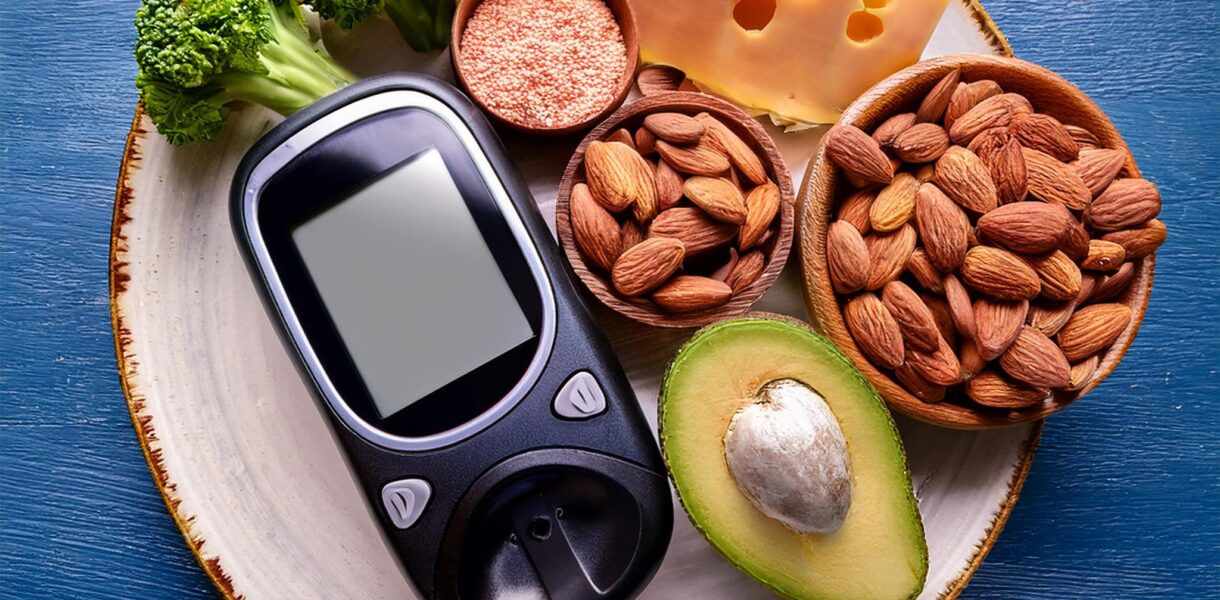The ketogenic (keto) diet is a high-fat, low-carb eating plan that has gained popularity for its potential health benefits. For people with diabetes, especially those managing Type 2 diabetes, the keto diet might offer some unique advantages, but it also comes with risks that need to be carefully considered. This article explores the pros and cons of the keto diet for diabetes, examining both its potential benefits and drawbacks.
What Is the Keto Diet?
The ketogenic diet focuses on drastically reducing carbohydrate intake (typically to less than 50 grams per day) and increasing fat consumption to encourage the body to enter a state called ketosis. In ketosis, the body relies on fats for energy rather than glucose from carbohydrates, which can impact blood sugar levels and insulin sensitivity.
Pros of the Keto Diet for Diabetes
1. Improved Blood Sugar Control
- How It Helps: Since the keto diet minimizes carb intake, it reduces glucose spikes after meals, making it easier to maintain stable blood sugar levels.
- Benefits for Type 2 Diabetes: People with Type 2 diabetes may experience better control over their blood sugar, which could reduce the need for certain medications.
2. Enhanced Insulin Sensitivity
- How It Helps: By reducing glucose in the diet, the body becomes less reliant on insulin. For people with insulin resistance, this can mean greater sensitivity and improved overall insulin function.
- Benefits: Increased insulin sensitivity can aid in managing Type 2 diabetes symptoms more effectively.
3. Weight Loss Support
- How It Helps: The keto diet’s high-fat content and low-carb structure often promote weight loss by increasing feelings of fullness, which can result in reduced calorie intake. Weight loss can play a major role in improving diabetes management.
- Benefits: Losing weight can also improve insulin sensitivity, benefiting both Type 1 and Type 2 diabetics.
4. Reduction in Cravings and Hunger
- How It Helps: The high-fat component of the keto diet helps keep people satiated for longer periods, which can reduce cravings for sugary or high-carb foods that can spike blood sugar.
- Benefits: Fewer cravings and more stable energy levels can simplify diabetes management by reducing instances of overeating or indulging in high-carb snacks.
Cons of the Keto Diet for Diabetes
1. Risk of Hypoglycemia
- How It Affects Diabetics: For people on insulin or other glucose-lowering medications, the keto diet can cause dangerously low blood sugar levels (hypoglycemia). Frequent monitoring and possible medication adjustments are necessary.
- Considerations: To avoid hypoglycemia, it’s crucial to consult with a healthcare professional before starting a keto diet, especially if you’re taking diabetes medications.
2. Potential Nutrient Deficiencies
- How It Affects Diabetics: Restricting carbs means cutting out many nutrient-rich foods like fruits, whole grains, and some vegetables, which are high in fiber, vitamins, and minerals.
- Considerations: To maintain a balanced intake, focus on including low-carb, nutrient-dense vegetables and consider dietary supplements as recommended by a dietitian.
3. Ketoacidosis Risk for Type 1 Diabetics
- How It Affects Type 1 Diabetics: Diabetic ketoacidosis (DKA) is a serious condition in which the body produces high levels of ketones, leading to dangerously acidic blood. Type 1 diabetics are more susceptible to this if they’re on a keto diet.
- Considerations: Type 1 diabetics should be cautious with the keto diet due to the risk of DKA and should seek guidance from a healthcare provider.
4. Digestive Issues
- How It Affects Diabetics: The keto diet can cause digestive problems such as constipation due to low fiber intake, which may impact overall health.
- Considerations: Incorporate fiber-rich, low-carb foods like leafy greens and consider fiber supplements to help maintain digestive health.
5. Challenging to Maintain Long-Term
- How It Affects Diabetics: The keto diet is restrictive, and it can be difficult for some people to sustain over time. Transitioning back to a regular diet can cause blood sugar spikes if not done carefully.
- Considerations: Those who choose the keto diet for diabetes should plan for a sustainable approach and be mindful if they decide to transition away from it.
Is the Keto Diet Safe for Diabetics?
The keto diet may be safe for some people with diabetes, especially those with Type 2 diabetes who do not require insulin. However, it requires careful planning and medical oversight, especially for people with Type 1 diabetes or those on blood sugar-lowering medications. Consult with your healthcare provider to determine if the keto diet aligns with your health needs and to monitor any side effects.
Diabetes Keto Diet Benefits: Is It Right for You?
Ultimately, the keto diet can offer significant benefits for certain diabetics, such as better blood sugar control, enhanced insulin sensitivity, and weight loss support. However, it’s important to weigh these advantages against the potential risks, including hypoglycemia, nutrient deficiencies, and the challenges of long-term adherence.
For those considering the keto diet, a personalized approach is essential. Consult with a registered dietitian or healthcare provider to tailor the diet to your specific needs and monitor your health regularly. With careful planning, the keto diet may be a useful tool for managing diabetes, but it’s not the only solution. A balanced, low-carb approach might offer similar benefits without the extreme restrictions of keto, making it a potentially more sustainable option.
By understanding the pros and cons, you’ll be better equipped to decide if the keto diet is the right approach for your diabetes management journey.
FAQs: Keto Diet and Diabetes
1. Is the keto diet safe for diabetics?
The keto diet can be safe for some diabetics, particularly those with Type 2 diabetes. It may improve blood sugar control and insulin sensitivity, but it’s essential to work with a healthcare provider to ensure safety, especially if you take blood sugar-lowering medications.
2. Can Type 1 diabetics follow a keto diet?
Type 1 diabetics should be cautious with the keto diet due to the risk of diabetic ketoacidosis (DKA). It’s important for Type 1 diabetics to consult their doctor, as the diet could lead to high ketone levels, posing health risks.
3. How does the keto diet affect blood sugar levels?
The keto diet is low in carbohydrates, which can help prevent blood sugar spikes after meals. Many people with diabetes report more stable blood sugar levels, though close monitoring is needed to avoid hypoglycemia.
4. What are the potential risks of a keto diet for diabetes?
Risks include hypoglycemia (especially for those on insulin or medications), nutrient deficiencies due to restricted foods, digestive issues, and, for Type 1 diabetics, the risk of DKA. It’s important to discuss these risks with a healthcare professional before starting.
5. How many carbs can I have on a keto diet for diabetes?
The keto diet typically restricts carbs to 20-50 grams per day to maintain ketosis. However, the exact amount varies by individual, so working with a dietitian to find the right carb limit for you is recommended.
6. Does the keto diet help with weight loss for diabetics?
Yes, the keto diet’s high-fat, low-carb structure often leads to weight loss, which can benefit Type 2 diabetics by improving insulin sensitivity and blood sugar control. Weight loss may also reduce the need for certain medications.
7. What foods are allowed on a keto diet for diabetes?
Permitted foods include meats, fatty fish, eggs, low-carb vegetables (like leafy greens), nuts, seeds, and healthy fats (like olive oil). Foods high in carbs, like grains, sugary foods, and most fruits, should be limited or avoided.
8. Can I eat fruit on a keto diet if I have diabetes?
Yes, but it’s best to stick to low-carb, low-glycemic fruits like berries (strawberries, raspberries, blueberries) in small portions. These are less likely to cause blood sugar spikes.
9. How long should diabetics stay on a keto diet?
There’s no one-size-fits-all answer. Some people follow the keto diet short-term to reset their blood sugar and insulin sensitivity, while others incorporate it as a long-term lifestyle. Consulting with a healthcare provider will help determine the best approach for you.
10. Can a keto diet reverse Type 2 diabetes?
While the keto diet can help manage Type 2 diabetes symptoms and improve blood sugar control, it may not be a cure. Some people experience remission, especially when combined with weight loss, but individual results vary.
11. Do I need to monitor ketone levels on a keto diet for diabetes?
Yes, monitoring ketone levels is recommended, especially for Type 1 diabetics, to avoid diabetic ketoacidosis (DKA). Ketone strips are readily available and can help ensure your levels remain in a safe range.





